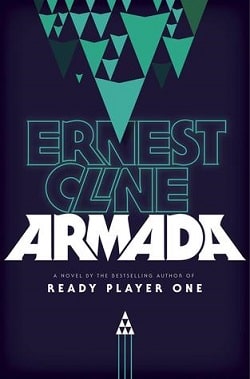Armada by Ernest Cline is a thrilling ride through the realms of science fiction, nostalgia, and the complexities of adolescence. Following the success of his debut novel, Ready Player One, Cline once again taps into the rich vein of pop culture, video games, and the universal desire for adventure, crafting a narrative that is both familiar and refreshingly unique.
At the heart of the story is Zack Lightman, a teenager who finds himself caught in the mundane routine of high school life, filled with the typical struggles of adolescence—anger issues, a lack of direction, and a yearning for something greater. Zack’s life is dominated by his obsession with video games, particularly a flight simulator called Armada, where players defend Earth from alien invaders. This setup serves as a clever commentary on the escapism that gaming provides, as well as the fine line between reality and fantasy that many young people navigate.
When Zack witnesses a flying saucer that resembles the ships from his beloved game, the narrative takes a sharp turn into the realm of the extraordinary. This moment is not just a plot device; it symbolizes the awakening of Zack’s potential and the realization that his dreams of adventure might not be as far-fetched as he once believed. Cline expertly builds tension and excitement as Zack is thrust into a world where his gaming skills are not just a pastime but a crucial asset in an impending alien invasion.
Thematically, Armada explores the idea of heroism and the expectations placed upon individuals, especially young men. Zack’s journey is not just about saving the world; it’s also about self-discovery and the struggle to reconcile his fantasies with the harsh realities of life. Cline delves into the psyche of a gamer, illustrating how the skills honed in virtual worlds can translate into real-life situations, albeit with a twist of irony. The narrative raises questions about agency, choice, and the nature of heroism, challenging the notion that one must be extraordinary to achieve greatness.
Character development is another strong point in Cline’s writing. Zack is a relatable protagonist, embodying the insecurities and aspirations of many young adults. His growth throughout the novel is palpable; he evolves from a dreamer into a decisive player in a high-stakes game. The supporting characters, including fellow gamers and mentors, add depth to the story, each representing different facets of the gaming culture and the broader societal implications of technology and escapism.
One of the most engaging aspects of Armada is its self-awareness and meta-commentary on the genre. Cline embraces classic science fiction tropes while simultaneously subverting them. The narrative is laced with references to iconic films, books, and games, creating a rich tapestry of intertextuality that will resonate with fans of the genre. This approach not only entertains but also invites readers to reflect on the influence of pop culture in shaping our perceptions of reality and heroism.
However, while Cline’s homage to the genre is commendable, it also raises a critical point: the reliance on nostalgia can sometimes overshadow original storytelling. Some readers may find the plot predictable, as it follows a familiar trajectory of the chosen one rising to the occasion. Yet, Cline’s ability to weave humor and heart into the narrative helps to mitigate this concern, making the journey enjoyable despite its predictability.
In comparison to other works in the genre, such as Ender’s Game by Orson Scott Card or Ready Player One, Armada stands out for its focus on the intersection of gaming and reality. While Card’s novel delves into the ethical implications of warfare and leadership, Cline’s story is more about the celebration of gaming culture and the camaraderie it fosters among players. Both novels, however, share a common thread of young protagonists facing extraordinary challenges, ultimately leading to personal growth and self-acceptance.
Overall, Armada is a delightful blend of adventure, humor, and introspection. Cline’s writing is accessible and engaging, making it a perfect read for both young adults and those who grew up in the golden age of video games and sci-fi. The novel captures the essence of what it means to be a dreamer in a world that often feels mundane, reminding us that sometimes, the line between fantasy and reality can blur in the most unexpected ways.
In conclusion, Armada is not just a story about saving the world from an alien invasion; it’s a celebration of the power of imagination, the importance of community, and the journey of self-discovery. Cline has crafted a narrative that resonates with anyone who has ever yearned for adventure beyond the confines of their everyday life. Whether you are a gamer, a sci-fi enthusiast, or simply someone looking for an engaging read, Armada is sure to leave you entertained and perhaps even inspired to embrace your own dreams.
























Reviews 0
Post a Reviews: